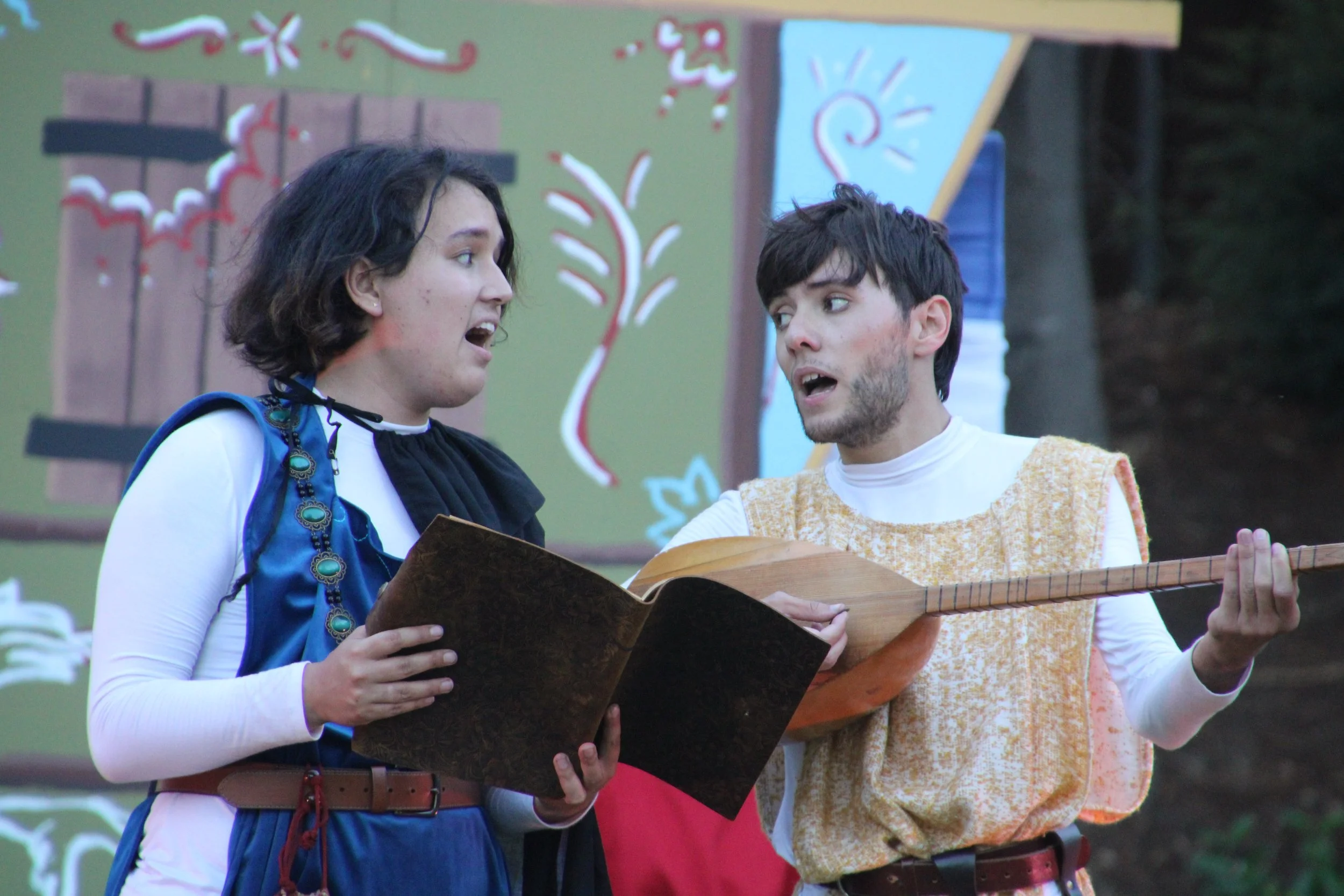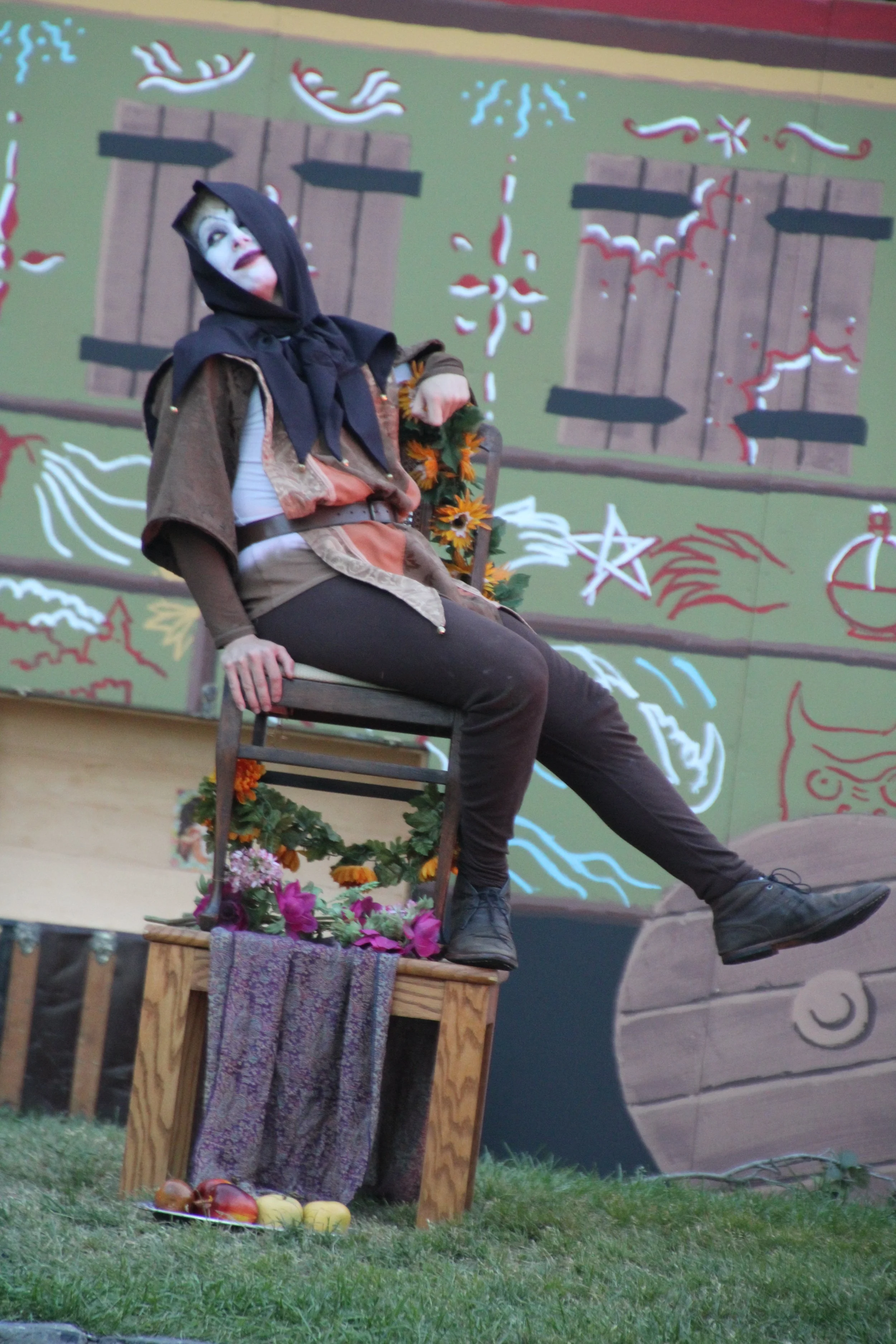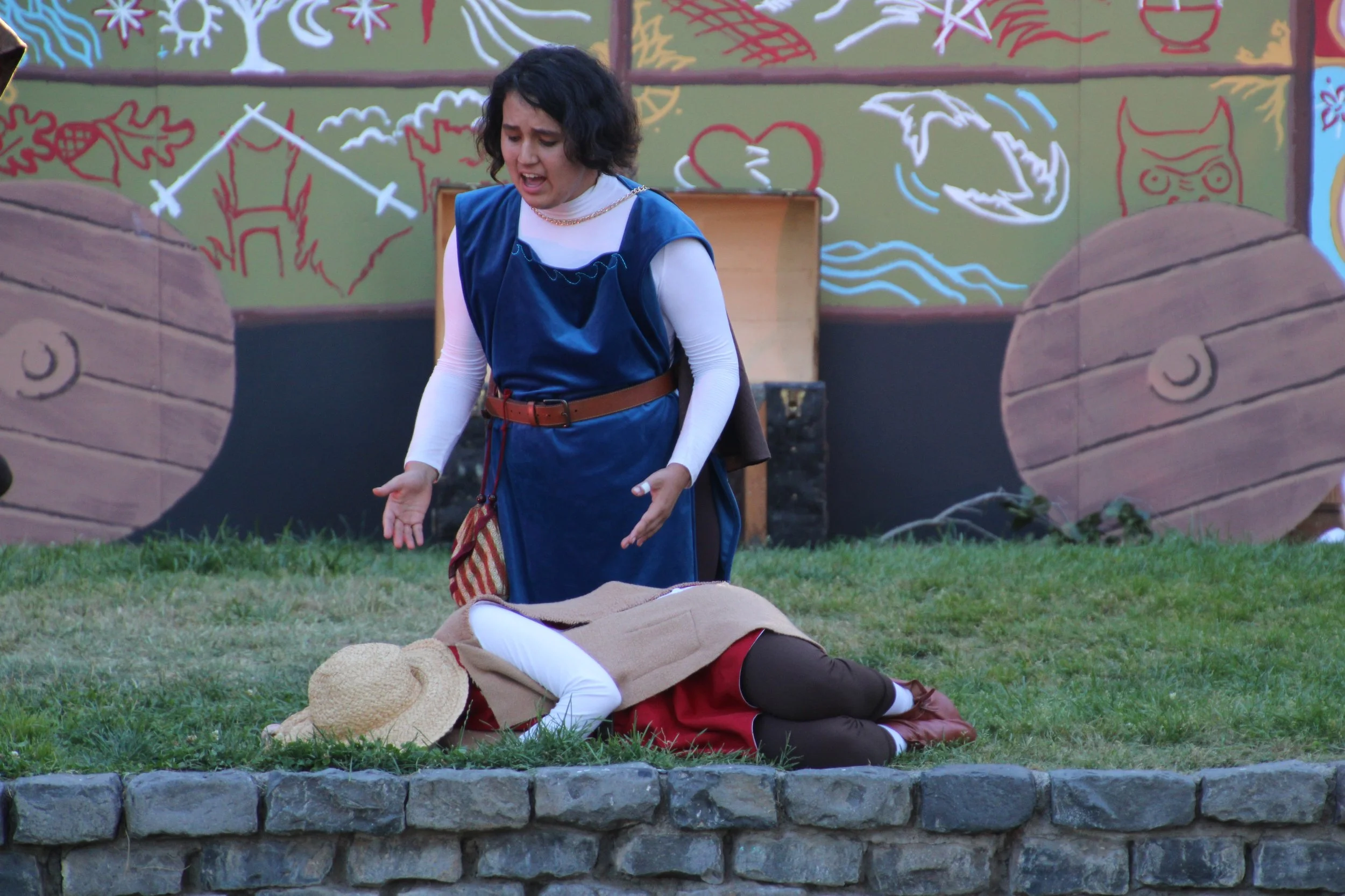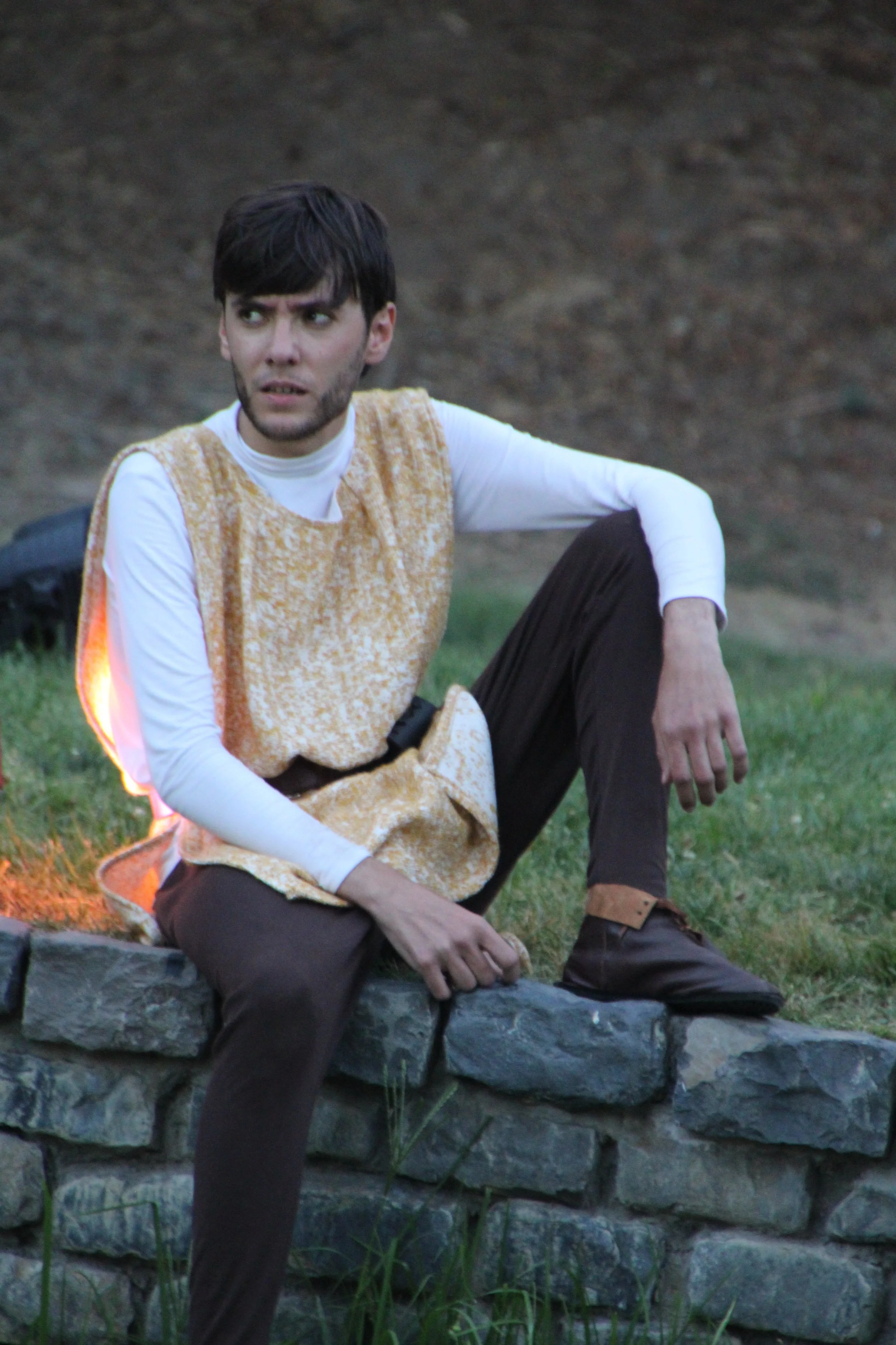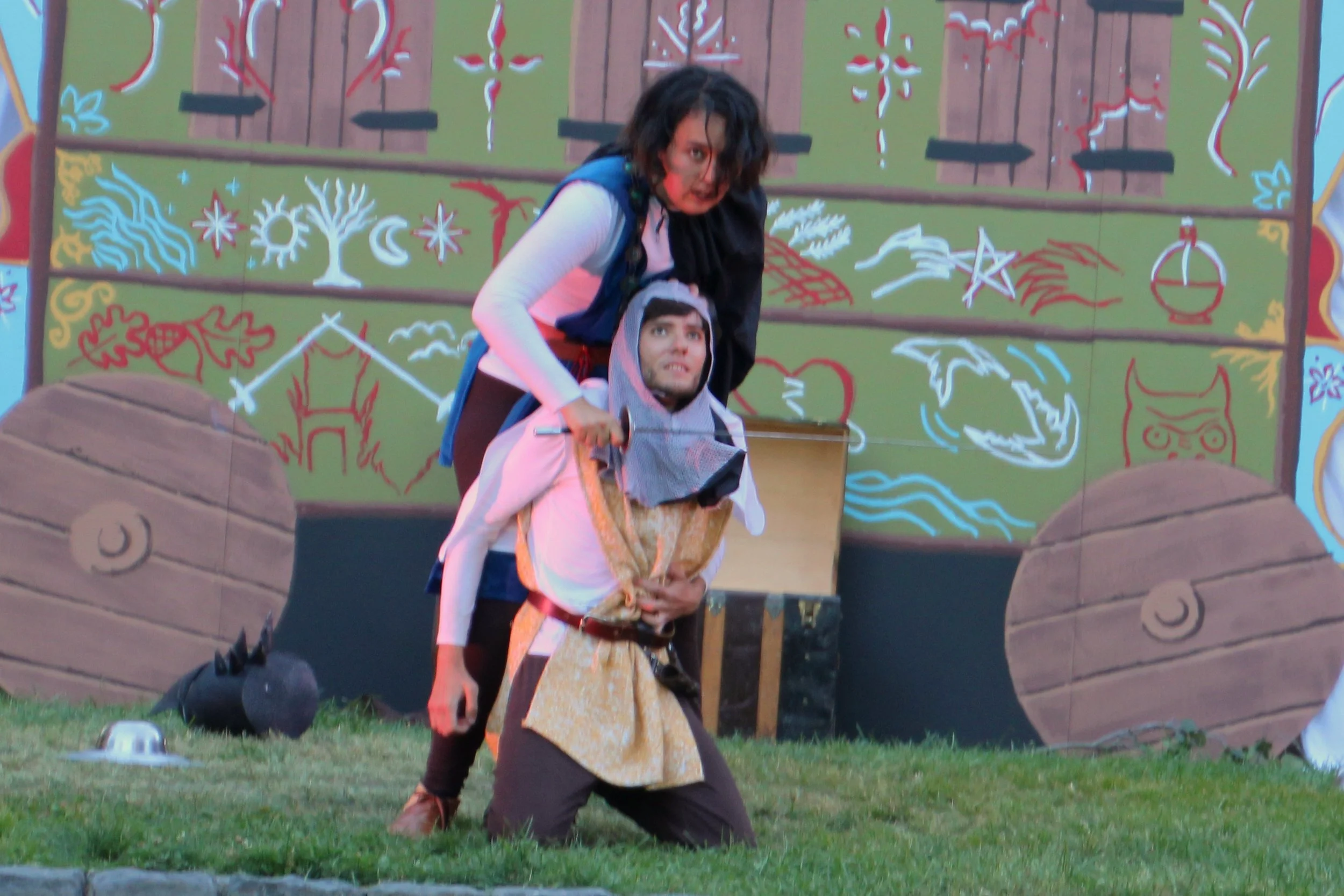POIOUMENON (2022)
A medievalist tragicomedy in two acts.
Somewhere in Europe, sometime in the Middle Ages, four archetypal performers (the Storyteller, the Poet, the Musician, and the Clown), are imprisoned by an unseen tyrant king and forced to perform for their lives night after night. The audience plays the role of the king’s court and bears witness to one such performance—a performance consisting of plays, masques, dances, songs, puppet shows, and more, through which the performers explore and debate their disparate philosophies on and relationships to their circumstances. And throughout which they hold out hope that maybe, just maybe, this will be the night they are set free...
Poioumenon is an original play by Cassian Grove and Rory Kinsolving, first performed August 5th and 6th, 2022, at Willow Street Frank Bramhall Park in San José. Cast
The Storyteller—Cassian Grove
The Poet—Winter Kamas
The Musician—Rory Kinsolving
The Clown—Lex O'Brien Lindquist
Guard No. 1—John Luis Soto Jr.
Ensemble—Anika Weinberger, Nick Johnson, Eliza Singer
Crew
Director/Musical director—Rory Kinsolving
Stage manager—Syl Tavernise
Assistant stage manager—Eva Waterman
Band—Anastasia Sullivan, Asher Burdick
Choreographer—Bruce Hamilton
Assistant choreographer—Fiona Kinsolving
Fight choreography and puppet design—Magnus Whitaker
Set design, logo design—Cassian Grove
Set construction—Sam Grove
Costume design and construction—Winter Kamas, Kenzie Derbiondi
Sponsors...
Costumes sponsored by Jennifer Koga and Sam Grove
Set sponsored by April Durrett and Matt Reilly
Programs sponsored by Barb Galiotto
Puppets sponsored by Eunice Anderson
Acknowledgements...
Poioumenon was produced under the auspices of Playful People Productions, Starhouse ATC’s fiscal sponsor for the season.
Instruments on loan thanks to Kristoph Klover of Flowinglass Music and to Kevin Cloud.
SYNOPSIS
Act 1
The four performers file onto the stage, and welcome the audience to the court of King Federigo V (“Ave Donna Santissima”). The Storyteller tells a Slavic myth about the origin of the world, with the Poet taking the role of God, and the Clown taking the role of the Devil. (“Stella Splendens”). The Poet attempts to recite love poetry, but the Clown mocks his romantic ideals, then playfully flirts with him, driving him off in embarrassment. The Storyteller begs the audience for donations.
The Clown monologues to the audience, revealing his cynical worldview through cruel humor, and the Poet and Musician debate whether hope or revolution are more powerful tools to support the oppressed.
This leads into a mummer-esque morality play, depicting the battle between Hope (as played by the Storyteller) and despair (as played by the Clown). In it, a farmer (played by the Poet) loses everything he has to a debt collector (played by the Musician). Despair nearly convinces the farmer to sell his soul to the devil (also played by the Musician), but hope helps him to refuse the offer (“Pais Dinogad”). However, the devil, after telling the audience that their inaction only helps him, manages to convince the farmer to give into despair. Despair leads the farmer to the center of a demonic morris dance, in which he is symbolically beheaded (“Tempus Transit Gelidum”). Hope brings a child onstage from the audience to help him revive the farmer, but upon returning to life, the farmer rejects both hope and despair, instead choosing pure pragmatism.
Having finished the morality play, the Storyteller once more reminds the audience to donate, and the Musician leads all present in a rowdy singalong (“Gregis Pastor”)
Act 2
The performers process through the audience to reintroduce the show (“Danse de Cleves”). A puppet stage has been erected in front of the true stage, with which all four characters perform a satirical puppet show, mocking the king directly with a preposterous, exaggeratedly heroic tale of his childhood, his rise to power, and his capture of the performers. The performers sing a work song as the puppet stage is struck (“A l'Entrada del Temps Clar”).
The Poet monologues on the nature of love in the face of an unkind world, and on the uncertain existence of free will. The performers begin another play-within-a-play, in which an errant knight (played by the Musician) is tasked with rescuing the daughter of the Oak King from the monstrous Briar Knight. The Oak King (played by the Storyteller) sets a number of challenges to the errant knight, who passes each with his cunning, all while the Musician modifies his dialogue to suit his philosophical differences with the Storyteller, shaping the story as he chooses. The errant knight processes through the audience to represent his journey to the Briar Knight’s castle (“La Roza Enflorese”). The errant knight battles the Briar Knight (“Schiarazula Marazula”), before forcing him to reveal himself to be the Oak King in disguise. The Oak King gains the upper hand in the battle, and the narrative of the play-within-a-play crumbles as the moral of the story becomes unclear and the performers begin speaking over each other, until finally the Storyteller stops it. The Storyteller and the Musician perform together (“Ja Nus Hons Pris”).
The musician attempts to rouse the audience into revolt, and, upon failing, muses upon his own existence as a fictional character, and on the struggle to balance political or philosophical message with art. The Storyteller ritualistically calls down the muse of Greek tragedy, and the performers begin a tragic masque, in which each actor recites their narration in highly stylized manner, but raises a mask to their face and delivers their dialogue within the masque in a heavily realistic manner. A sailor (played by the Musician) wakes to find himself imprisoned. His cellmates, a young prince (played by the Poet) and an old beggar (played by the Storyteller), explain that he has been captured by an ogre (played by the Clown), who forces them to tell stories each night on threat of death. The old man tells the first story, telling of an old man whose three sons die in different ways. Each time, his heart breaks, and each time, his daughter sews it back together, devoting her entire life to mending it. When she finally fixes it entirely, she dies of exhaustion, but the old man’s heart can no longer break for her loss, and he lives alone for many more years. The ogre accepts this story. The prince tells the second story, telling of a species of songbirds which learn not to sing their mating songs for fear of hunters, and thus, even after hunting them is forbidden by law, never mate again and quickly die out—a clear metaphor for the Poet’s own relationship with the Clown. The ogre complains about the pointlessness of the story, but accepts it. Finally the sailor is called upon to tell his story, but instead berates the ogre for his cruelty, railing against his unjust imprisonment. The ogre sentences him to death, and as the guards approach, the sailor begs first his fellow prisoners and then the audience itself for mercy, telling them that it isn’t part of the show and begging them to react beyond what is expected at a play. The guards drag him away, and break his mask, and the Musician stands emotionless. The Story tells the audience that there is beauty in an unsatisfying ending to a story.
The Poet attempts to reach out to the Clown, suggesting that they run away together, but the Clown resists his optimism. From behind his ogre mask, the Clown demonstrates through his clowning that they have been imprisoned so long that they have forgotten their own names and personalities. Having finally stopped the Poet’s hope, he gives him his mask and mockingly recites the love poetry the Poet had recited in the first act.
The performers enact a strange ceremony, slowly building an empty throne out of their onstage material and placing offerings of flowers and fruit at its feet (“Mirie It Is While Sumer Ilast”). Upon completion, the Clown jumps onto the throne. The four discuss their predicament, directly contrasting their disparate philosophies on life. Their conversation grows heated, but immediately before it can come to blows, a guard runs in and informs them that the king has died. Believing that this means their freedom, they each celebrate in their own way, before a passing comment from the guard makes it clear that a new king has already taken his place, and their performances are expected to continue forever. Numbly, the performers reset the stage for their next performance, disjointedly quoting lines from and adding bleak endings to the stories they have told that evening, and stripping out of their distinguishing costumes and makeup into indistinguishable undergarments. Finally, they stand in a line, and repeat the introductory dialogue from the first scene, each actor now taking a new role. They repeat their opening song (“Ave Donna Santissima”), this time beginning with a stark, Gregorian arrangement, which builds into a wild, raucous mirror of the introductory version, as the players slowly lose their woes in the act of performing once more.



